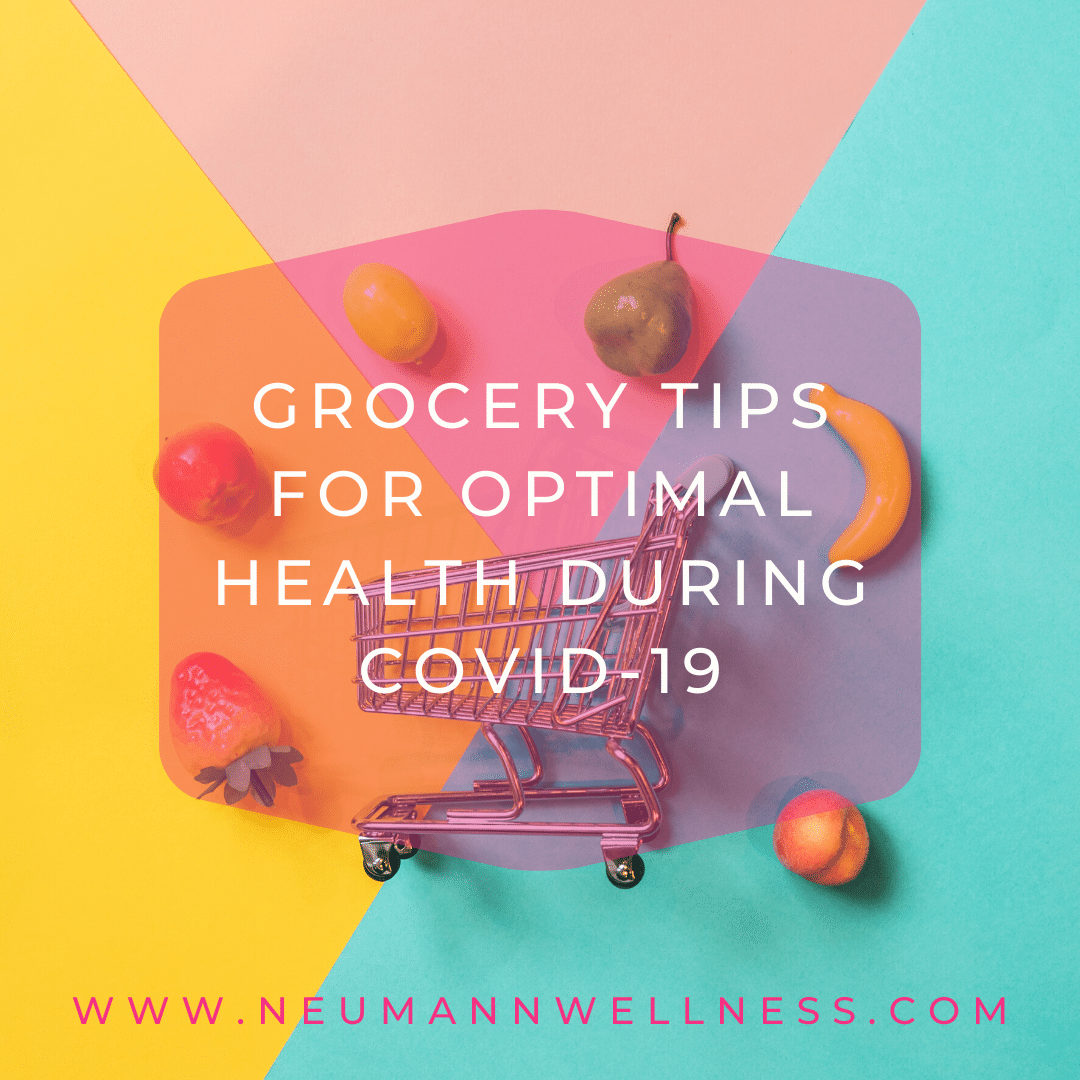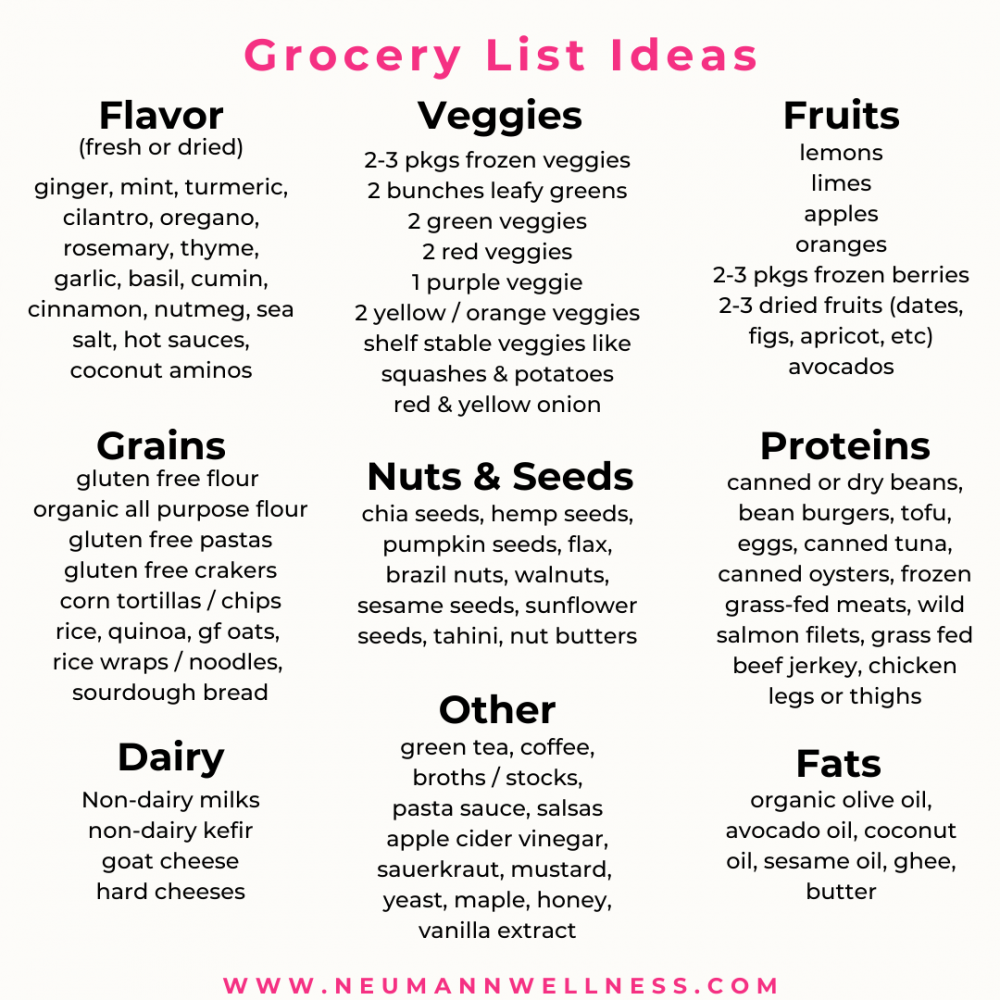Grocery Tips for Optimal Health during COVID-19

As an integrative dietitian I wanted to provide you with practical grocery shopping tips on how to stock your home for optimal health during COVID-19. We all know that the fundamentals of our overall health starts with diet.
In the face of COVID-19, it’s practical (and recommended) to stock up on a few of the essentials. While not hoarding everything on the grocery shelf, you’ll want to make sure you have a few of these staples handy in your home for when you need it.
You don’t have to be concerned that grocery stores are going to run out of stock. However, the benefit of keeping a stocked pantry is that you’ll limit the number of times you need to leave your home and it’ll help you to maintain a sense of calm and readiness.
In this article I’ll review a recommended list of foods and supplements and my favorite organic, whole foods with simple ingredients that are optimal for digestive health.
Herbs & Spices
Adding plenty of fresh and dried herbs & spices to your meals provides a boost of anti-oxidant protection, reduces inflammation, provides antimicrobial action against viruses, aids in digestion, while modulating your gut bacteria favorably.
These can be implemented dried or fresh; if you use dried herbs make sure they’re not older than 12 months for optimal health benefit.
- ginger
- mint
- turmeric (fresh and dried)
- cilantro
- parsley
- oregano
- thyme
- rosemary
- basil
- cumin
- coriander
- cinnamon
- nutmeg
- cayenne pepper
- paprika
- black peppercorns
Veggies
Full of insoluble & soluble fiber, vitamins, minerals, and beneficial anti-oxidants, you want to aim to make vegetables a staple of your diet if you already aren’t. The fiber in vegetables feed our beneficial microbes and as a result keep the immune functioning in our gut healthy and ready for battle. Consume 5 servings daily of organic and/or locally sourced vegetables whenever possible.
- 3 packages of a variety of frozen veggies
- 2 bunches of leafy greens (kale, chard, mixed greens, dandelion greens, arugula, spinach, etc)
- 2 green veggies
- 2 red veggies
- 2 yellow / orange veggies
- 1 purple veggie
- red & yellow onions
- shelf stable veggies like white potatoes, sweet potatoes, varieties of squash
Fruits
Packed full of potassium, fiber, vitamin C, and anti-oxidants, fruits are super important sources of beneficial nutrients for immune support. You’ll want to choose fresh or frozen options that are organic whenever possible. Opt for about 2 servings daily.
- 3 packages of organic frozen berries (strawberry, raspberry, blackberry, blueberry, etc)
- frozen pineapple and mango
- lemons
- limes
- oranges
- apples
- bananas
- 2-3 dried fruits (dates, figs, apricot, cranberry, etc)
Grains
Whole grains provide a source of carbohydrate, fiber, and micro-nutrients important for your body. Refined grains, like breads, cereals, and the like are associated with inflammation and blood sugar imbalances so you’ll want to opt for whole grain whenever possible.
Also, gluten-containing grains are most often related to causing gut issues, chronic inflammation, and autoimmune conditions because they increase intestinal permeability and initiate a pro-inflammatory immune response. If you struggle with gut issues you’ll most likely want to switch to a gluten-free. I’ve listed a few of my favorite gluten-free grain ideas below.
- Gluten-free flour
- Gluten free pasta (usually lentil, chickpea, or rice based)
- Gluten free crackers (mary’s gone crackers, edward & sons rice snaps, simple mills almond flour crackers)
- corn tortillas
- corn chips
- rice (brown and jasmine)
- gluten free oats
- rice wraps
- rice noodles
- quinoa
- sourdough bread (less gluten than regular breads; for true sourdough bread, look for “sourdough starter” on ingredient list)
Nuts & Seeds
Nuts and seeds provide beneficial fats, fat soluble vitamins, and protein to create satiety. If you struggle with nuts and seeds try them in different versions. For example, you may not tolerate whole almonds but you may tolerate almond butter or almond milk (listed in non-dairy section). Seeds like chia act as a bulking agent so may be beneficial for those struggling with diarrhea. You don’t have to go “nuts” adding these, just a handful or a couple tablespoons at a time will do.
- chia seeds
- hemp seeds
- pumpkin seeds
- flax
- brazil nuts
- walnuts
- sesame seeds
- sunflower seeds
- tahini
- assorted no additive nut butters (brands like artisana or maranatha), freshly ground in store, or better yet make your own
Protein
Here I’ve listed both plant based and animal based protein options. It’s my personal opinion that you should get a variety of both. Whenever purchasing animal proteins, opt for grass fed and pasture raised items. These products will have higher amounts of beneficial Omega 3 fats available in them; Omega 3 fats are important for calming inflammation in the body.
- canned beans (pinto, chick pea, black bean, cannellini)
- dry beans (chick pea, black bean)
- organic tofu
- pastured or organic eggs
- canned tuna
- canned oysters
- sardines
- fresh grass fed meats
- frozen grass-fed meats
- wild caught salmon filets
- grass fed beef jerkey
- chicken breast, legs, or thighs with skin
Dairy & Non-Dairy Substitutes
Since cow’s milk is a common stressor for many of my Digestive Reset Program clients, I’ve included non-dairy products and dairy products with minimal lactose in them. Please keep in mind that you may not be sensitive to dairy, but if you struggle with gut issues this (along with gluten containing products) would be one of the first food categories to eliminate.
Also, dairy products tend to cause mucus and phlegm build up. This is especially concerning should you have an active cold or flu infection, dairy products should be avoided in this scenario.
- unsweetened non-dariy milks (rice dream, elmhurst, malk, aroy-d coconut milk)
- non-dairy kefir
- goat cheese
- hard cheeses (manchego, aged cheddar, parmesean, etc)
Fats
Fats are important for boosting absorption of nutrients, optimal brain function, hormone balance and more. Fats generally get a bad rap but I’m here to tell you they’re essential and it’s more about choosing the right type of fat.
The fats I list below ideally should be organic. Liquid fats (like olive oil) should be stored in tinted glass jars. Avoid liquid fats stored in plastic or clear containers as these oxidize and cause free radical damage to your cells. Solid fats (like coconut oil) may be more stable and ok to store in clear containers.
- organic olive oil
- organic avocado oil
- organic coconut oil
- sesame oil
- grass fed ghee
- grass fed butter
Other
This category has some of the fundamentals you’ll want to have in your pantry. Fermented foods, yeasts, sweeteners, and more. If you struggle with diarrhea, I recommend avoiding caffeinated beverages as this can stimulate bowel contractions. Opt for decaf versions instead.
- organic green tea
- organic coffee (or decaf)
- broths / stocks, or make your own
- pasta sauce
- salsas
- vinegars (apple cider, balsamic, distilled)
- soy sauce or coconut aminos
- sauerkraut
- mustard
- baker’s yeast
- maple
- honey
- vanilla extract
- sparkling no-additive mineral water
Supplements
I wrote an extensive article about what immune boosting supplements you’ll want to have on hand (and why) during the COVID-19 pandemic. For those struggling with digestive issues, I listed a few of the essential digestive support supplements below.
I’ve created a “COVID-19” category in my online Fullscript supplement dispensary for the immune boosting supplements and under “Digestive Support” you can find the digestive support supplements I mention. You can create a Fullscript account free of charge, and order any of the suggested brands I list below.
These supplement guidelines are just suggestions, I do not know your individual health scenario. As always, please consult with your healthcare provider before adding in any supplements as they have to potential to negatively interact with pharmaceuticals and/or particular health diagnoses:
Finally it’s SUPER important to purchase high quality supplements from high quality vendors, like Fullscript, as Amazon reported to its consumers that they’re likely receiving counterfeit supplements.
- Bean Assist
- Digestive Enzymes
- Daily Multivitamin
- Zinc
- Vitamin D
- Probiotics
- S. Boulardii
- Electrolytes
- Prebiotics
- Monolaurin
- PQQ
- Paleo Reds
- Whole Body Collagen
- NAC
- Vitamin C
- Melatonin

I sincerely hope you found this article helpful and helps to ease your mind about how to stock your home during these challenging times.
Remember not to panic! Grocery stores have a consistent supply chain so it’s important not to over-buy so that others will have access to foods as well. This list is simply meant to highlight how to strategically stock your pantry to minimize the number of trips you’ll have to make each week.
Shopping at your local health food store is the best way to support a small business, so I encourage you to do that if at all possible. Otherwise, do your best to find organic foods with simple ingredients. Wishing you optimal health during this challenging season.
Be well,
~Sarah
References:
